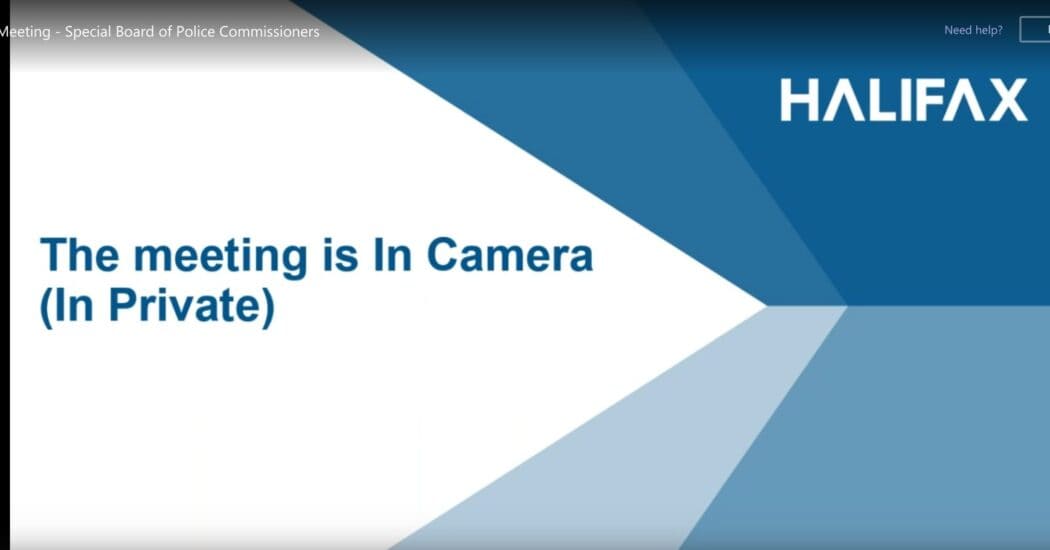
KJIPUKTUK (Halifax) – A motion at today’s Halifax Board of Police Commissioners meeting to appoint a community advisory committee to explore defunding the police was moved in camera. In camera means that neither reporters nor the public can be present.
The motion was deferred after the issue was discussed in camera, with Lindell Smith opposed. We will never know why.
The Board is fond of these in camera sessions. The commissioners went famously in camera to review the Wortley report when it was first published on December 13 2018.
See also: Board of Police Commissioners briefing on carding should not be secret
And now again, discussions about the committee’s mandate and membership took place in secret, because somehow knowing how commissioners want to approach this issue is none of our business.
This is remarkable since, as reporter Zane Woodford pointed out earlier, the Police Act, which defines these processes, clearly does not allow the Board to go in camera for these types of discussions.
“Meetings of the board are open to the public, but all matters relating to discipline, personnel conduct, contract negotiations and security of police operations may be conducted in private and, where the matter relates to a complaint against or the discipline of the chief officer, the chair may request that the chief not attend and the chief shall not attend,”
A press release issued this morning by the Nova Scotia Policing Policy Working Group (NSPPWG) states that PPWG steering committee member El Jones was asked by Halifax Board of Police Commissioners Chair Natalie Borden to lead a committee for the purpose of recommending a definition of “defunding the police.”
The NSPPWG is a recently formed coalition of prisoners rights and anti-racism groups. The group has pushed for defunding of the police and more stringent oversight.
In the press release, as well as in a letter and subsequent emails sent to the Commission last week, the group pushes back on the narrow mandate of the defunding committee in the way the Board’s motion defines it.
“We envision this process as broader than creating a definition. While a definition can provide some guidance in terms of directing debate, ultimately it is our recognition that a definition without research behind it becomes subject to much dispute and is limited in its utility,” the press release states.
Instead the group proposes four tasks that the committee should take on:
1) Compiling a report on the current research, public debates, and practices in municipalities across Canada and in the U.S.
2) Engaging a public consultation process together with the board similar to the one that took place in Edmonton, where community members, groups, non-profits, etc. are involved in providing their capacities, visions, expertise, etc. in resourcing communities particularly in areas of housing, mental health, addictions, employment, public services, etc.
3) Examining/developing relevant policies to the Board surrounding the processes of resource allocation.
4) Presenting our findings to the Board and to City Council in a public format in order to allow engagement with these resources and with this research.
In its initial letter the group asked to be a participant rather than a spectator in today’s discussions around the mandate of the committee.
Well, not only will its members, including El Jones, the person suggested to lead the effort, not be able to participate, they will not even be able to hear the discussions. Neither will the public for that matter.
In its work plan the Commission mentions how it wants to increase public participation. This is how not to do that.
It would be laughable if it wasn’t so serious. What we’re witnessing are the Commission’s efforts to render harmless, through secrecy and delaying tactics, the public demand for police accountability.
The question to ask is, who are the commissioners really working for?
With a special thanks to our generous donors who make publication of the Nova Scotia Advocate possible.
Subscribe to the Nova Scotia Advocate weekly digest and never miss an article again. It’s free!




If it involves public money, it must be ON camera. Preferably webcast in real time.
If they are concerned about the public’s trust, as they recently stated, secrecy is not the best way to go about this.